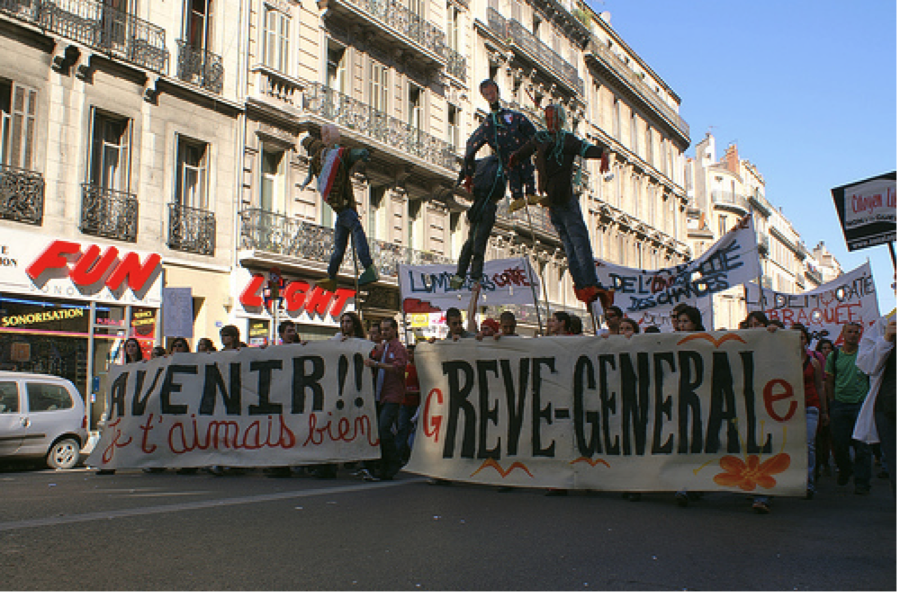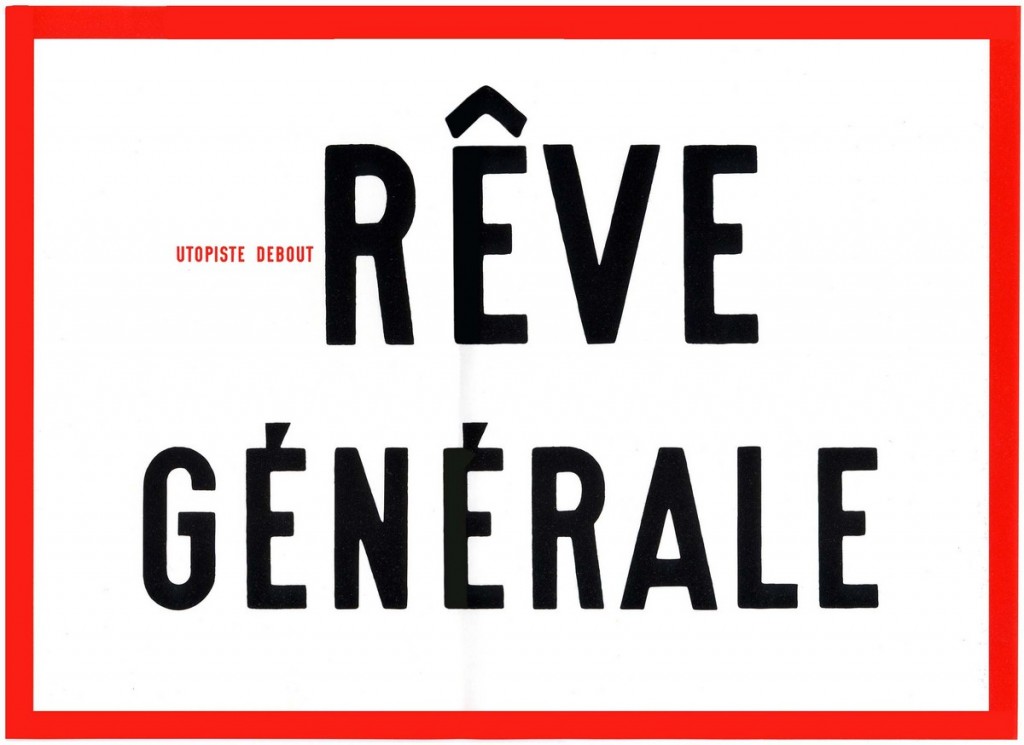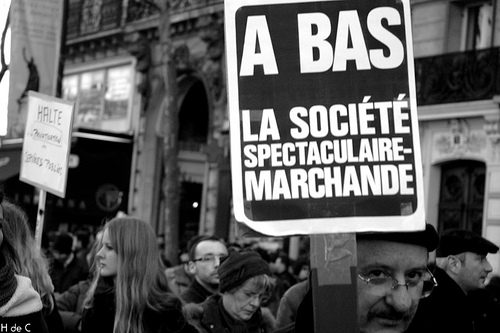In 2006 I was stuck. Could you really in that oh-so-sophisticated era of globalization or late capital write about the general strike? That Spring, students and other young people across France went on strike against the “precariousness” of modern life. Anglophone commentators ridiculed the term as showing the absurdity of the French. Somewhere online I saw this photograph:
It was a student march in (I think) Marseilles. The banner at the front reads: (on the left): “Avenir: je t’aimais bien“–“Future: I really love you”. And on the right a pun: “gRêve Général(e). You can’t translate this exactly: it means general strike/dream–add or subtract the G and the E at the end to make “strike” or “dream.”
Out of nowhere, as it seemed, the general strike had returned and reimagined itself at once: a general strike, a general dream. It was a challenge to the idea of the future as permanent austerity. It represented the general strike not as a quantitative measure of how many people out of the working population were willing to strike but a qualitative re-imagining of the future.
The idea went viral in French politics and could be seen all over the 2009 demonstrations in the wake of the financial crisis.
It was part of a broad-based anti-capitalist imaginary, derived in part from the Situationists and the revolution of 1968.
In this poster, carried by someone who looks so French it’s almost parodic, the call is “Down with the Consumer Society of the Spectacle.”
What does a “general dream” mean? One way to understand it might be to put together Walter Benjamin’s concepts of the general strike and the dream image. Benjamin saw the general strike differing from the standard political strike in that it began
in the determination to resume only a wholly transformed work, no longer enforced by the state, an upheaval that the strike not so much causes as consummates.
These strikes were “general” not because everyone took part but because their aim was a general transformation and renunciation of domination. Benjamin saw this vision of revolt as not being violent but rather as “deep, moral, and genuinely revolutionary.” The right to look. The invention of the other.
That is to say, the general strike dreams the future that is to come (avenir), in what was to become Benjamin’s theory of the dream image. Dream images arise collectively when, says Benjamin,
the new is permeated by the old. These images are wish images; …what has been comes together in a flash with the now to form a constellation.
Just as the general strike creates “a general image” of social conditions that otherwise struggle to be known and understood, so does the dream image try to
overcome …the inadequacies in the social organization of production.
The general strike is the limit of the dream image, its enactment as social life. Benjamin thought of the “constellation” which these images form as something he called “collective consciousness.” This idea can be thought of as what Virno, appropriating Marx, has called the “general intellect,” a stage of social life “at which mental abstractions are immediately, in themselves, real abstractions.”
The “general dream” is, then, just such a real abstraction in which the activity of the mind has the value of material fact. A general dream/ strike is the materialization of the potential that is inherent in the (image) of social action not as violence but as means.
The general dream founds the possibility of a new politics. And here we are three years later and a new formation has appeared in French politics. The Front de Gauche, the Left Front, headed by Jean-Luc Mélenchon has a program that includes:
a 100% tax on earnings over $475,000; full pensions for all from the age of 60; reduction of work hours; a 20% increase in the minimum wage; and the European Central Bank should lend to European governments at 1%, as it does for the banks.
Now that’s not a dream, but it’s a long way from what you could propose in the Anglophone world. Mélenchon stands at 17% in the last opinion polls before the first round of the Presidential elections this Sunday. He has promised that the Left Front will not enter into coalition with the likely winner, the “Socialist” François Hollande. Hollande has made his intentions clear by saying that his first act if he wins will be to visit Berlin, the capital of Euro-austerity.
From ridicule and street demonstrations in 2006 to being a significant factor in national politics in 2012 by means of the general strike and its dream. It’s something to keep in mind over the next few weeks, as the negative reactions to May Day pour in from all sides.




Pingback: Occupy (and) 1968 | Occupy 2012